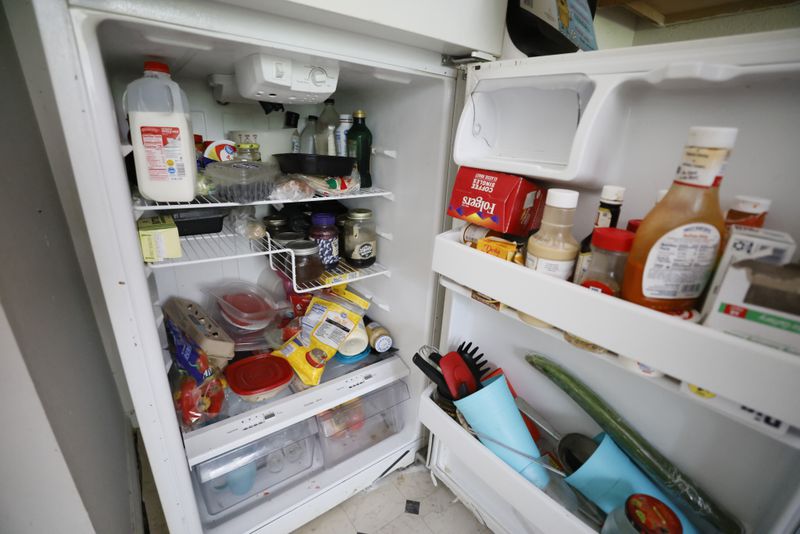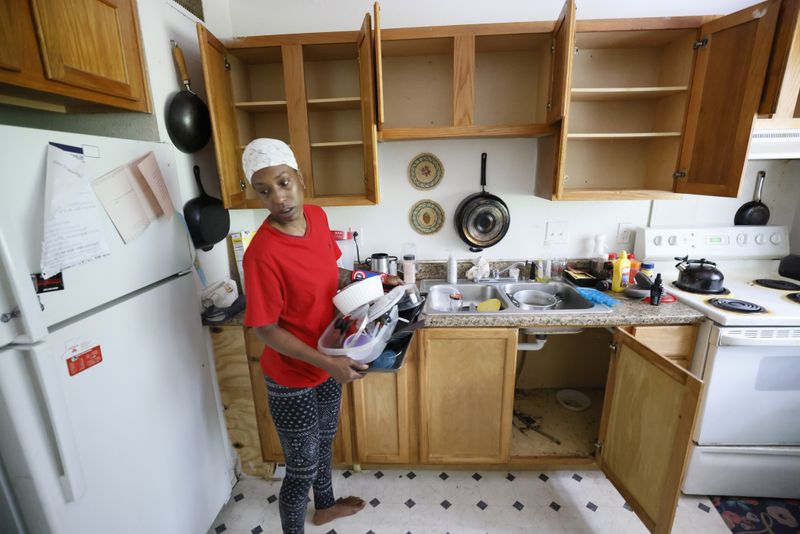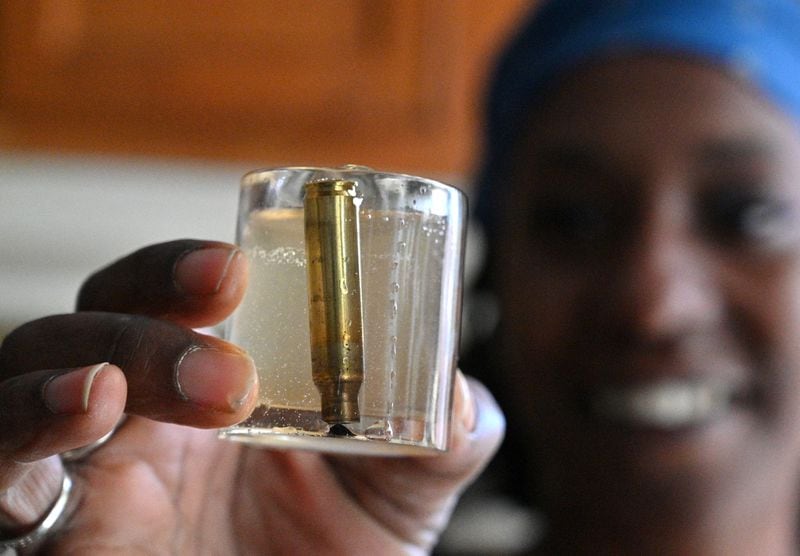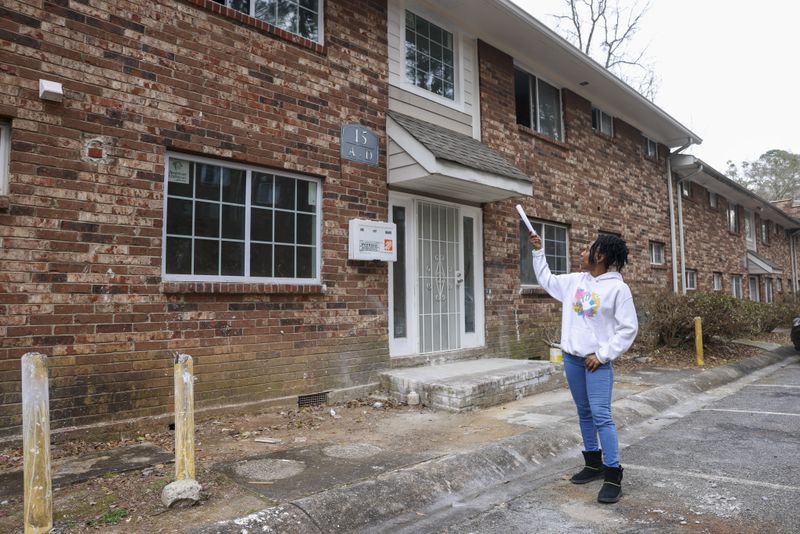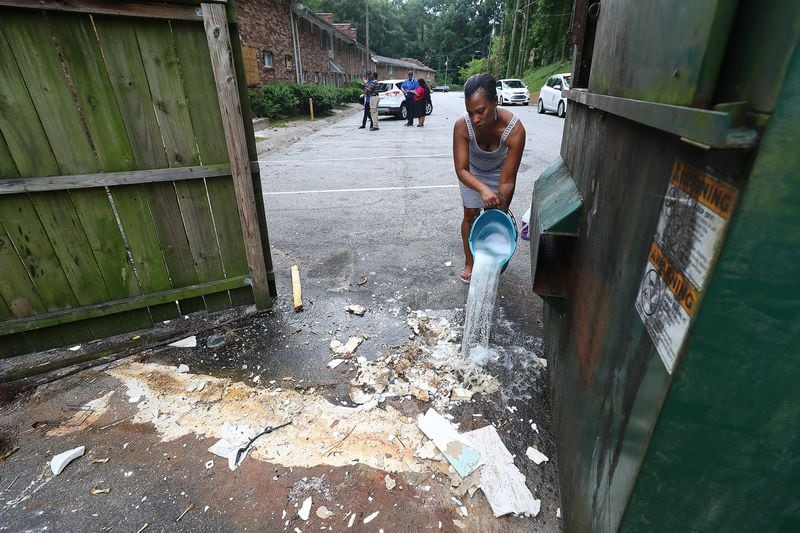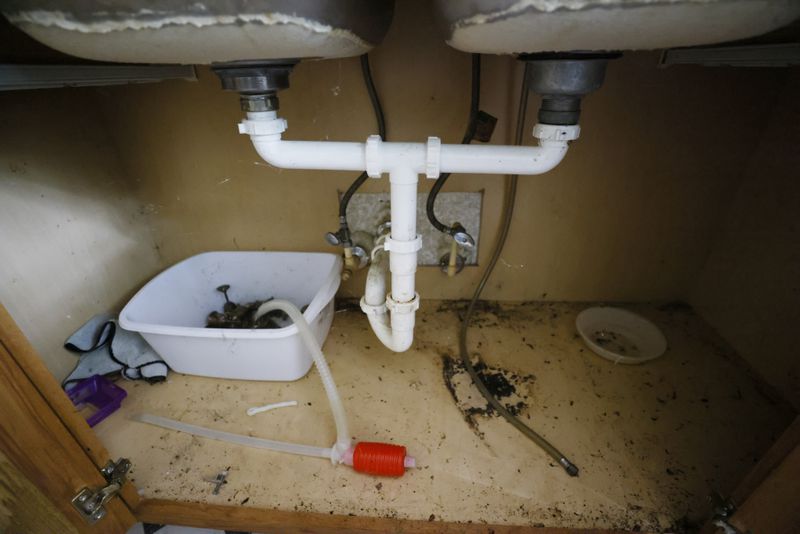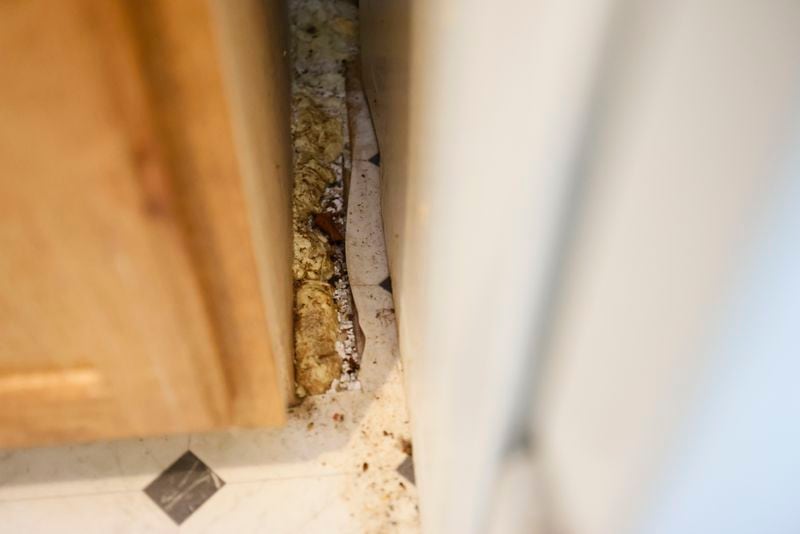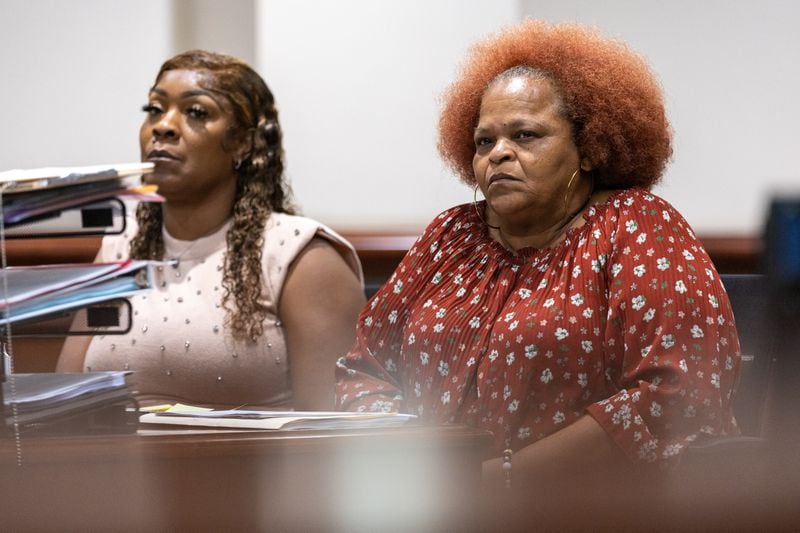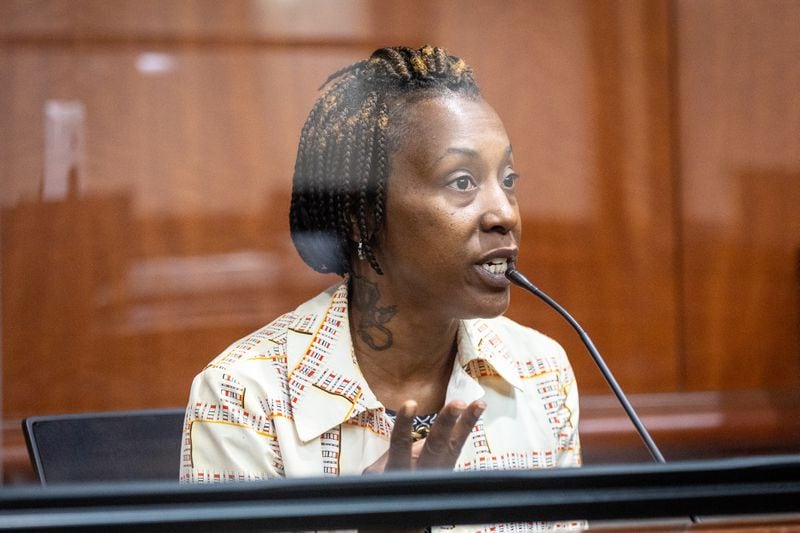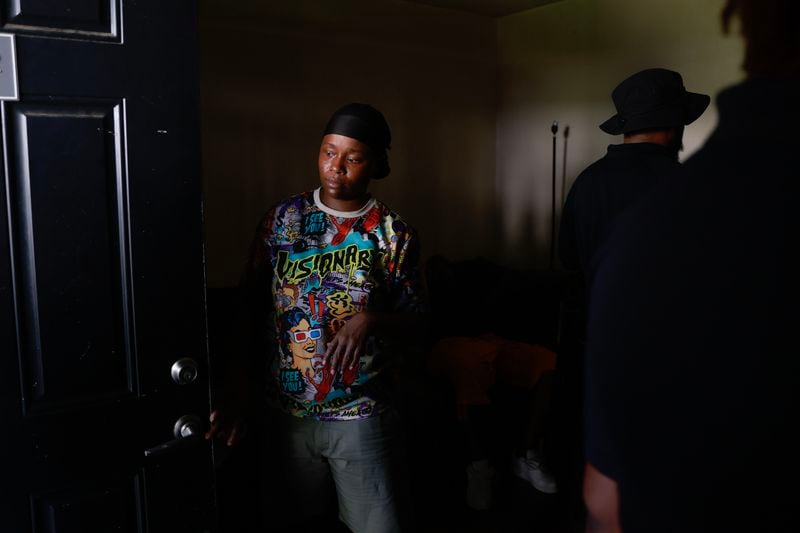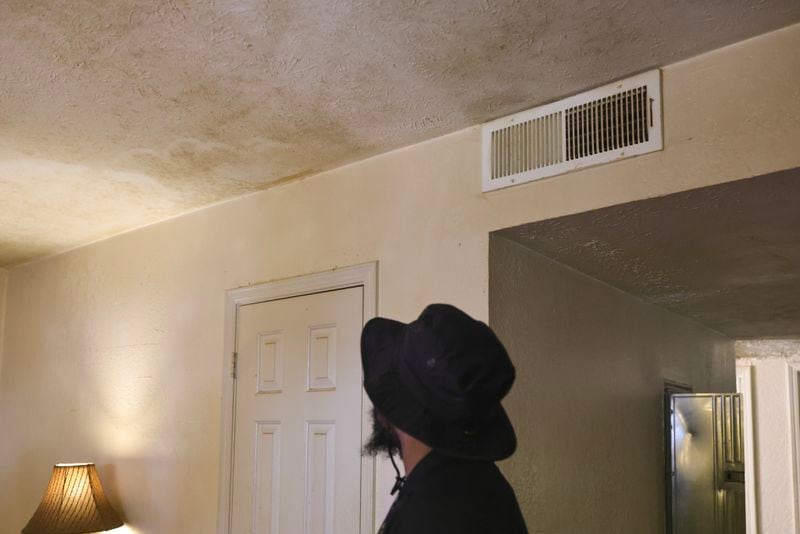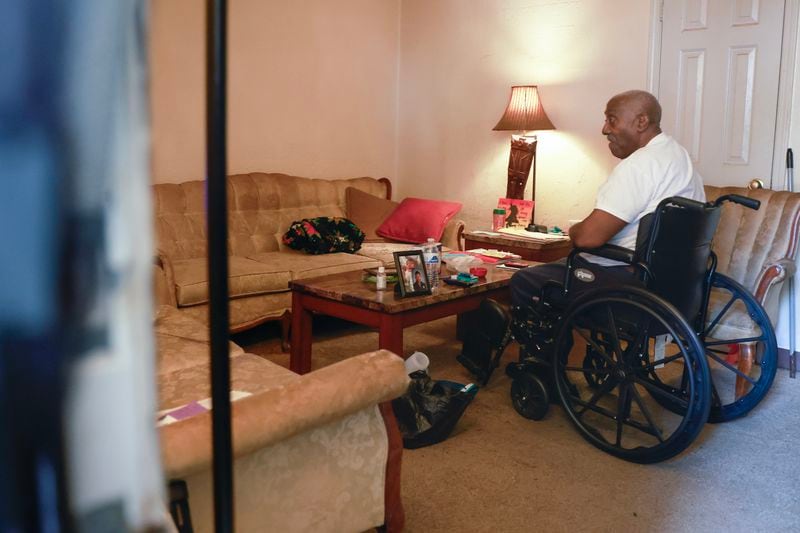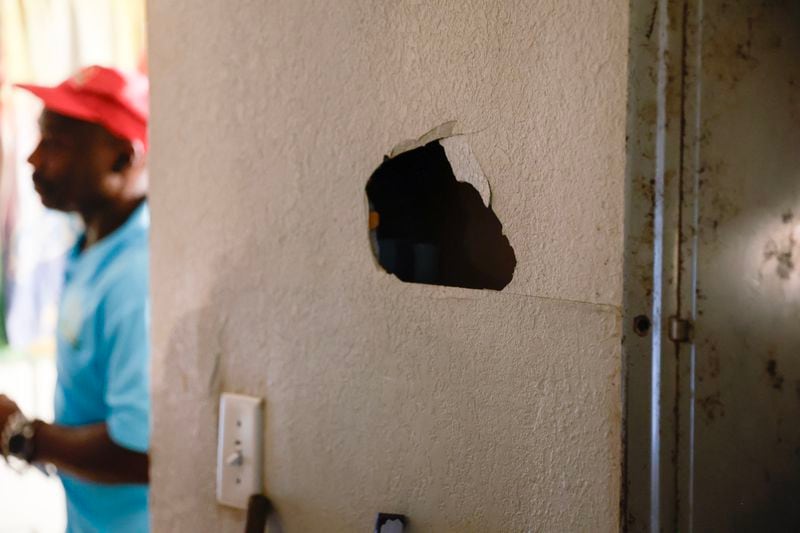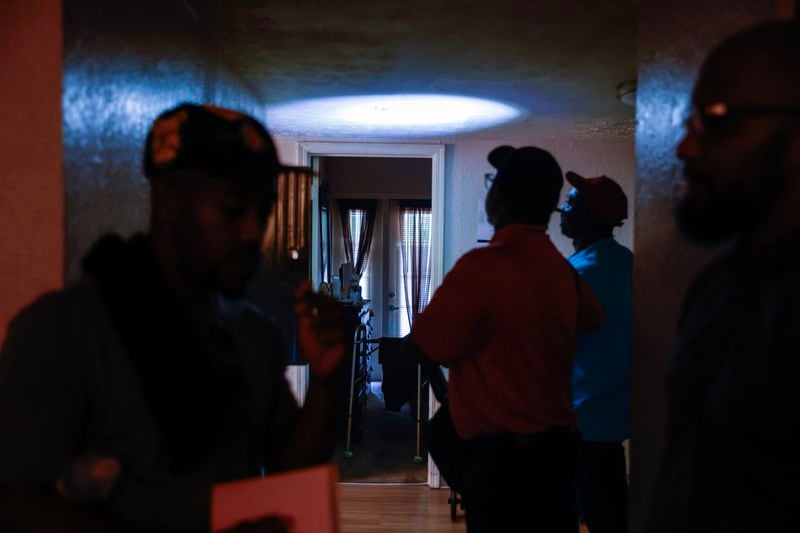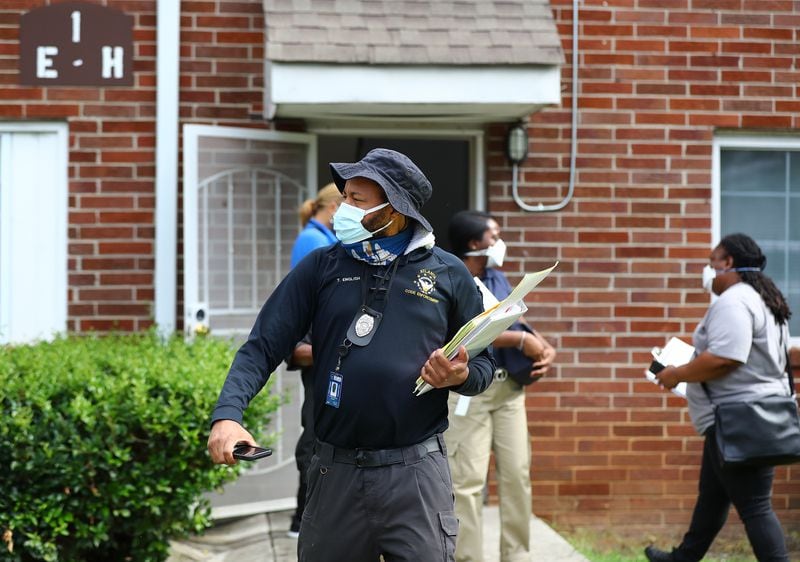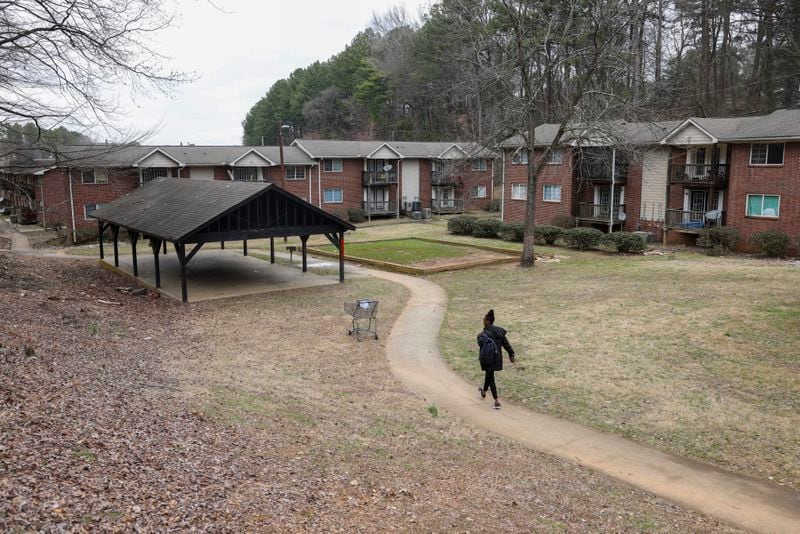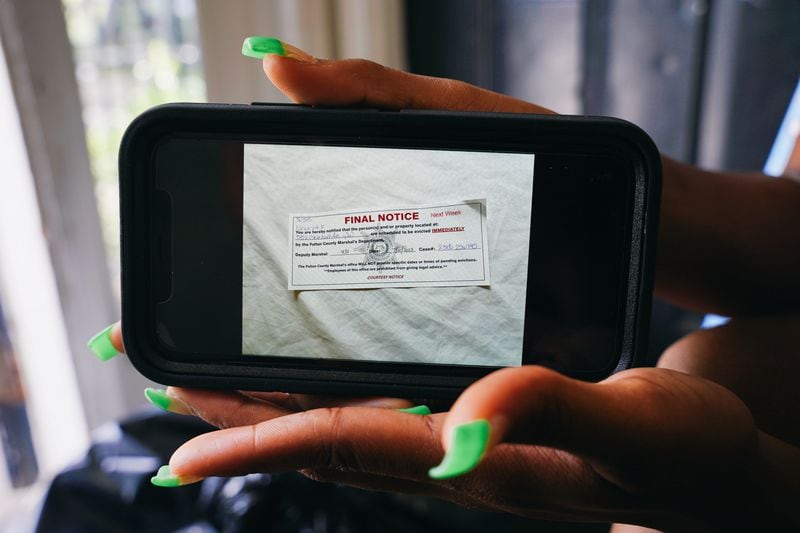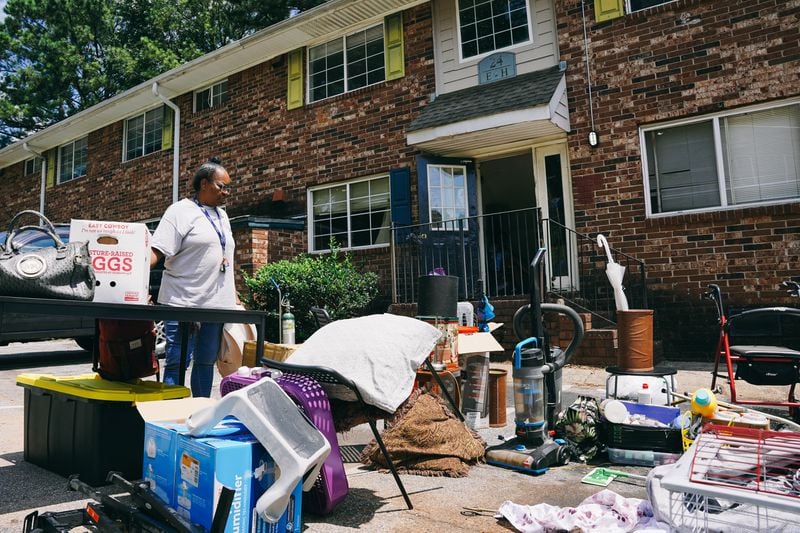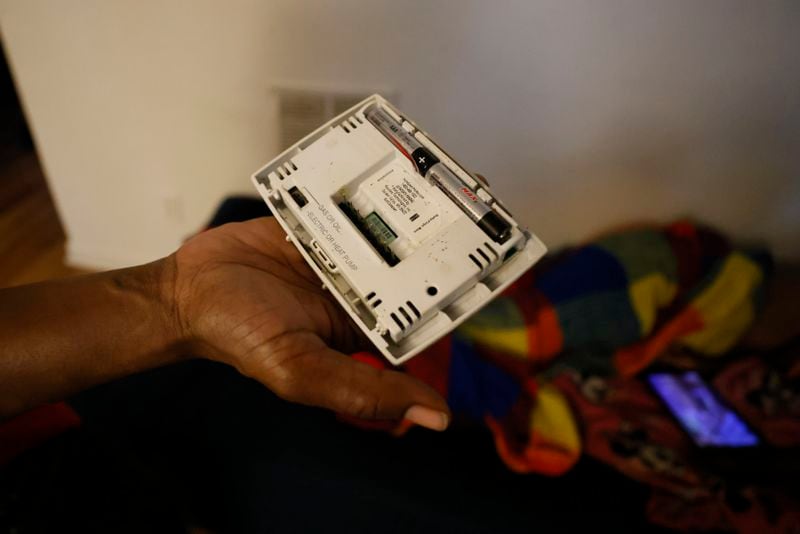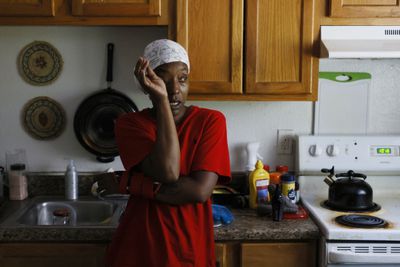
The ‘War’ at Home
Atlanta leaders said they were willing to go into ‘war mode’ against dangerous apartments. More than a year later, residents feel they’re on their own.
Atlanta’s new way of fighting slumlords was put to the test on a Wednesday morning in April, as Danielle Russell stood before a municipal court judge. She did not know if she could hold back her anger any longer.
For three years, she had been chasing intruders from her southwest-side apartment building only to have them return to sleep in the stairwell. She had resorted to stowing her flatware in the refrigerator after her complaints to the city about rats and cockroaches crawling over her kitchen had come to nothing.
Although going to court would cost Russell a day’s wages and a write-up for missing work, it would be worth it, she thought, for a chance to speak to a judge about what she and her neighbors had endured at Pavilion Place apartments.
Instead, what happened was this: Code enforcement officers, other city functionaries and two managers from the apartment’s front office filed into the courtroom, but the case’s prosecutor and lawyers for the complex never showed.
There was confusion over whether prosecutors and the owners had struck a last-minute deal, so the judge delayed the hearing for three weeks. On her way out, an enraged Russell flung open the courtroom doors.
“This is corruption!” she shouted.
More than a year after Atlanta leaders said they were willing to go into “war mode” against landlords who let their complexes buckle under the weight of neglect and crime, it remains easy to be a slumlord within city limits.
Angry talk of quick crackdowns has given way to a promising, longer-term strategy that requires stringent oversight and unwavering commitment that local leaders have never previously shown.
This may bode well for Atlanta renters in the future. But for now, tenants are left to wage their fights as best they can.
City leaders pledged reforms after The Atlanta Journal-Constitution began publishing its Dangerous Dwellings series in June 2022, which included the stories of Russell and other tenants. That investigation found that Georgia had some of the weakest tenant protections in the nation, allowing private equity firms and other out-of-town investors to reap millions of dollars from the metro area’s persistently dangerous apartments.
The toll is staggering. These investors leave tens of thousands of people in Clayton, Cobb, DeKalb, Fulton and Gwinnett counties to live amid violence and unhealthy, unsafe conditions. Combined, these complexes house at least 13,000 school-age children and have accounted for at least 281 homicides and 20,000 serious crimes in a recent five-year period. Nearly all are in nonwhite neighborhoods.
Credit: Miguel Martinez
By the time Russell, 47, appeared in court that April morning, her housing troubles had worn away at her sanity. As a collage artist, she insisted on a tidy home and enjoyed decorating the apartment’s sparse rooms with artwork in various stages of completion. But often, the roaches ruined her work. They swarmed to eat the glue on her collages and left trails when they marched across gold leafing that had not yet dried.
The thought of vermin crawling in her sheets kept her awake. Sometimes she couldn’t bring herself to eat, losing 13 pounds from her already slim frame. Some people told her she should give up her fight against Pavilion for her own sake, Russell said. They didn’t understand how much was at stake.
“I don’t know why no one can see I’m fighting for my life,” she said.
Uprising
Back in 2020, when Russell moved into Pavilion Place, the art teacher was homeless but far from helpless. Of all the tenants interviewed for the AJC’s Dangerous Dwellings investigation, she seemed to be the most resourceful.
As an Atlanta native, she was well-versed in the ways of getting things done in this city. Her mother worked for years in permitting at City Hall, she said. As a Savannah College of Art and Design alum, she could hold her own when she spoke to artists, journalists and city councilmembers.
Credit: Miguel Martinez
She was the one to reach out to reporters in October 2021 after her landlord refused to move her from her damaged apartment. Electricity had become spotty after a fire damaged her building, and rats from adjoining burnt-out units began chewing through her walls. She had been sending photos and detailed emails to managers and code enforcement officers and called police after she suspected a break-in.
“No one answers the office phone. Can I please get a reply?” one email to apartment managers said.
Credit: HYOSUB SHIN / AJC
Another: “The rat is eating all my dry goods.”
“Rat Rat Rat Rat Rat,” a subject line read.
Yet the rats and other dangers remained.
Frustrated by constant gunfire, she took dozens of spent cartridges she found on Pavilion’s grounds to an art studio, where she encased them in clear epoxy that she shaped into cups.
She called them the Shots Fired Shot Glasses.
As the AJC’s stories published, Russell had good reason to expect change. She was named by City Council President Doug Shipman in June 2022 to a new city task force to improve safety in apartment complexes, and she had the satisfaction six weeks later of watching teams of inspectors fan out across Pavilion’s 19 acres for a code enforcement detail.
City of Atlanta solicitors used their findings as evidence when they asked a judge for permission to demolish the complex if the landlord did not clean up its act. The property was a nuisance under Georgia law, they argued.
The sense of urgency soon faded. The task force, founded by Councilmember Michael Julian Bond, never met, and he has not responded to AJC requests for an interview. By December, city solicitors had dropped their request for permission to demolish the complex. The reason is unclear. Filings said new information had come to light, but later Deputy Solicitor Erika Smith said prosecutors did not have enough evidence to have Pavilion Place torn down.
Even if it were demolished, there would not be enough places for tenants to go. The region’s housing shortage is so severe that it may need more than 100,000 affordable units to plug the gap, Atlanta Regional Commission estimates show.
Meanwhile, it didn’t seem that Beverly Hills, California-based landlord Behzad Beroukhai had made any real effort to address the complex’s deep troubles. For all Russell knew, his family continued to enjoy the lavish lifestyle that his wife had detailed in a 2021 divorce filing: a cellar of fine wines and Scotches, a $1,500-a-month spa membership and restaurant meals worth $250 or more five times a week.
Russell was still living in her fire-damaged building, which code enforcement had declared unfit for habitation. As her feud with Pavilion dragged on, her chances of moving to a safer place vanished when she fell behind on rent after a pandemic job loss. Emergency rental assistance came through, but Pavilion refused to accept it and filed to evict her, she alleged in court filings.
Credit: Jason Getz / Jason.Getz@ajc.com
Pavilion dropped the case, but the damage was done. Only Atlanta’s most troubled apartment complexes would accept a tenant with a recent eviction filing and little cash.
Everywhere she turned, it seemed that the system was rigged to protect her landlord, not her. Feeling she had no other way to fight back, Russell quit paying rent.
In most other states, she would have been within her rights. But in Georgia, this was a choice to live on the brink. Under state law, tenants must never withhold rent, no matter their home’s condition.
This was Russell’s one-woman uprising. She took up patrolling the grounds, snapping photo evidence of violations and filing new code complaints to build a case against the complex. And though the city apartment task force never met, she decided it could still do some good for Pavilion. She told her neighbors she was a member and offered to show them how to fight back.
Channeling her anger into action was better than feeling helpless. “So I just keep filing complaints,” she said.
A new strategy
Most of her neighbors were too afraid of landlord retaliation to accept Russell’s offer. Others told her they had too much going on to take on this kind of fight.
Those neighbors included about 40 people living at Pavilion as part of a state housing program for those with mental illness; the Georgia Department of Behavioral Health had paid nearly $1 million in rent to the complex since 2020 to house them. Russell had watched its most troubled clients shuffle across the grounds during the day and listened as they wailed and screamed into the night.
Credit: Curtis Compton / Curtis.Compton@
“At least they’re not homeless — that’s what I heard them say,” she said. But to Russell, their suffering was an outrage. Why put people living with mental illness in the kind of place that could drive anyone mad?
One neighbor who was recovering from cancer used chicken wire to close the holes that rats chewed through his walls. Once, a squatter climbed onto his second-floor balcony, screaming and spoiling for a fight. Another’s ceiling showed a softball-sized hole that grew as it leaked for one year.
When the April hearing was scheduled, Russell saw a chance to hold Pavilion accountable – to her and them. Though the city had abandoned its fight to see the complex demolished, the solicitor’s office planned to pressure its owner to make repairs by going to civil court, armed with documentation of the violations that inspectors had found months before.
Once the hearing was delayed, Russell grew anxious that court proceedings would be just like the task force. All show, no real action. But she did see signs that the city’s new strategy was getting the complex owner’s attention.
Credit: Miguel Martinez
Credit: Miguel Martinez
Something that looked like repair work began to take place at Pavilion.
Yet many things that workers touched never seemed to get fixed.
At Russell’s apartment, workers failed to patch up a strip of damaged kitchen flooring, concealing it behind pieces of cheap cabinetry instead. A maintenance worker replaced her roach-infested bathroom door, but it jammed shut days later, trapping her inside for 40 minutes. Video taken by her adult son showed firefighters using an ax and pry bar to pop open the door.
Russell emerged wearing a bath towel. “I just got off work. I just wanted to take a shower,” she said. “Happy Sunday.”
‘Nuisance’
As work continued at Pavilion, the city’s prosecution efforts expanded with the filing of nine code enforcement cases against Fairburn-Gordon I & II apartments, a complex partially owned by Pavilion’s Beroukhai. In May, Mayor Andre Dickens announced that the team that launched the prosecution was renamed the Safe and Secure Housing program, and he dedicated $800,000 to hire a litigation team solely to investigate troubled housing and prosecute owners. A new $600,000 Housing Help Center would serve as a one-stop shop for affordable housing assistance.
Pavilion had come into compliance on at least 70 violations arising from about 50 civil complaints across the complex by the time Russell’s day in court arrived. All violations had been addressed except hers, solicitor Smith told Chief Judge Christopher Portis.
Photos entered into evidence during the hearing showed that a rat or other animal was using insulation inside Russell’s oven drawer to make a nest, leaving its droppings behind. Roaches were crawling inside its LED display. A swarm of them had scattered from a kitchen drawer when a code enforcement officer pulled it open.
Russell was the problem, not Pavilion, a manager told Portis. Repairs went unfinished, the manager said, because she was rude to pest control workers, badgered contractors and failed to let workers into her unit.
“Miss Russell has become a nuisance,” the manager testified.
Portis promised to issue a written ruling soon.
“Nuisance?” Russell said afterward. “I’m the nuisance?”
Credit: arvin.temkar@ajc.com
Credit: arvin.temkar@ajc.com
Still, the chance to testify pulled a weight off Russell’s shoulders. Someone with the power to force change had finally listened.
Russell felt like taking up painting again. She took long walks on the Beltline, carrying her finished works in her backpack and leaving them where passers-by might find them: a bold abstract with swirling lines and dots in black, white and red; a portrait of a woman nursing an infant, a golden sun behind her.
On June 9, Russell won. Judge Portis ruled that Pavilion had 30 days to make her apartment habitable. The doors, ceilings, floors and walls were to be repaired, and the roaches and rats driven out.
What’s more, Portis ordered Pavilion to conduct pest control across the entire complex at least quarterly for two years. The overall conditions were so concerning that the property may match the city code’s definition of “highly hazardous,” the order said.
Under state law, this designation could make the complex eligible for demolition if it continues to decay.
In total, the case cost Pavilion’s owners $7,751 in penalties and fees.
A healthy market
Signs that the city’s Safe and Secure Housing program is making progress appeared on one of the hottest afternoons of this summer, as inspectors went door to door to investigate a dozen complaints about the notorious Woodland Heights complex.
Men gathered to watch in lawn chairs, toddlers splashed in a blow-up pool, and a woman shouted about how puddles of trash and sewage collected at her and her neighbors’ front doors each time it rained. Two Atlanta code enforcement trainees spied a rat lazing on the lawn, unbothered by the commotion.
“Sunbathing,” one quipped.
It took three hours that July afternoon to canvass a single building, and only some of the tenants were home to let the inspectors in. But that such an inspection took place at all was important news, said Chanel Zeisel, director of housing policy for Mayor Dickens.
Alongside city code enforcement were inspectors from Georgia Department of Community Affairs and Invest Atlanta, which create, subsidize and regulate much of the area’s scarce affordable housing. The agencies rarely collaborated in the past, Zeisel said. Now they meet consistently to track the city’s most troubled properties.
“We want to see a really healthy multifamily market,” Zeisel said. “And what I mean by that is, healthy in the sense that the apartments are dry and they are safe, but they are also affordable.”
There will be no shortcuts to getting the most neglectful owners to comply. Teams of inspectors will have to return repeatedly to the worst properties until they get the message, Zeisel said.
Credit: NATRICE MILLER
“I think that it would be nice to say, ‘Oh, we can just go and show this super overwhelming show of force,’” Zeisel said. “But we live in the U.S., which values private property rights quite strongly and provides a lot of protection for those.”
Georgia landlords have even fewer checks on their power than counterparts in other states. This year, legislators failed to pass a bill that for the first time would have required rentals to be “fit for human habitation.”
As the city’s litigation team took shape, prosecutions against troubled property owners shifted into gear. So far, the program has taken legal action against seven Atlanta apartment complexes out of 98 identified by the AJC as persistently dangerous. It also logged inspections or other action on 16 more and issued at least hundreds of notices to owners and other parties that their properties were violating city code.
The hope is that, over time, aggressive enforcement by the city and affordable housing agencies will force the most notorious owners to clean up or sell. Combined, these agencies’ power over conditions could be extraordinary. Financing agencies have the power to conduct physical inspections, look at financial records and, in extreme cases, revoke or claw back subsidies.
That’s not how it works now. Invest Atlanta, which has financed $46.75 million for a developer to acquire and renovate Woodland Heights since 2017, may block a developer from getting financing for a new project if an existing one falls short of standards, but a spokeswoman said in a written statement that it has never had to do so.
Although its contract with Woodland Heights allows the city to sue if the complex breaks city code, Invest Atlanta’s statement said the agency refers serious problems to the state Department of Community Affairs or Atlanta Housing, the city’s housing authority.
The Georgia Department of Community Affairs said it provided lucrative tax credits to 16 of the Atlanta complexes on the AJC’s list of persistently dangerous apartments, including nearly $25 million to Woodland Heights over 10 years. It has inspected 13 and has clawed back tax credits on none of them, even though several have had problems for years.
Federal time limits on the agency’s powers keep it from taking more aggressive action, and voluntary compliance is in the best interest of the program and properties, a DCA official said in a written statement. The state agency is now hiring and organizing a four-person team to keep on top of its most troubled properties.
Other key agencies are missing from the city’s program or play limited roles. The affordable housing system is so vast and disconnected, it’s hard to know what agencies subsidize tenants in which complexes.
No one from the U.S. Department of Housing and Urban Development showed up to the Woodland Heights detail, even though the agency subsidizes rent across the complex. The department discusses conditions with the city but decides on its own what steps to take and conducts its own inspections, according to a statement from a spokeswoman.
An Atlanta program to provide housing during the first year of the COVID-19 pandemic placed tenants in at least 21 complexes found by the AJC to house people in persistently dangerous conditions, including Pavilion Place. Administrators for the state Department of Behavioral Health and Developmental Disabilities’ program to house people with mental illness have not attended task force meetings.
Fixed
That Pavilion is in compliance now on nearly all of its August 2022 violations does not mean that Russell’s neighbors live in safe, habitable conditions. It does mean that its owner Beroukhai has bought time, and business continues as usual.
Credit: Curtis Compton / Curtis.Compton@
During AJC visits to review the resulting repairs, one tenant said through a closed front door that nothing is wrong and urged a reporter to please go away. But of the tenants who agreed to interviews, none said their homes had been put right.
“What do you mean ‘fixed’?” one tenant asked. New kitchen flooring installed in one unit was warping, and a door was falling off a kitchen cabinet. A tenant of a newly renovated apartment could hear rats chewing inside her walls and found their droppings on a bedroom windowsill. A third said he was grateful for the repairs, then let slip that his hot water had been out for close to a month.
And then there are the units where violations were never cited. One tenant showed a rathole in her bedroom wall that she closed off with duct tape. Two inches of water stood in the water heater closet.
All asked that their names be withheld for fear of retaliation.
“People just don’t want to get involved because they got to have somewhere to stay,” Russell said. “Being homeless is a hard choice.”
Credit: Jason Getz / Jason.Getz@ajc.com
Under heightened city scrutiny, Pavilion’s managers appeared to be keeping a closer eye on whether tenants were reporting conditions to authorities. One manager surveilled the grounds in a tan Chevrolet as Constance Alford, a 10-year resident, described how she had butted heads for years with the leasing office over rats, a sewage backup, mailbox break-ins and rent she left unpaid.
Credit: Olivia Bowdoin
Although the crackdown on Pavilion meant junk cars were towed from the parking spaces outside Alford’s door, city code inspectors never came inside, she said. Had they done so, the disabled 60-year-old said, she would have told them that no amount of disinfectant could stop mold from sprouting from the walls and ruining her furniture.
Alford appeared to be most angry about the squatter hiding in the apartment across the hall. She cussed and hollered and pounded her fist on his door.
“I’m not scared of you!” she shouted. “You got to go! You got to go!”
The manager in the tan Chevrolet paid the squatter no mind. Instead, she ordered a security guard to escort reporters from the property. Over the following three weeks, a team of workers painted Alford’s walls in a soft eggshell white, installed new flooring and started repairs on her broken stove. The manager assured Alford she would give her a new lease, the tenant said.
On the fourth week, Alford learned that the renovations were never meant for her. Fulton County marshals arrived to execute an eviction order for unpaid rent that a judge had approved months earlier. They left her belongings in the parking lot where the junk cars once sat.
The unit was empty, ready for the next tenant.
Credit: Olivia Bowdoin
The wait
Whether the Safe and Secure Housing program will be able to make the city’s most troubled properties livable remains far from certain. On the northwest side, a six-year lawsuit between Beroukhai and other owners of Fairburn-Gordon I & II apartments bogged down repairs. Owners had defied a judge’s orders to attend code enforcement hearings and inspections and failed to fund the complex’s repairs, a court-appointed receiver said. He asked a judge in June to find the owners in contempt, throw them in jail and remove him from the case. The complex made repairs on the violations as of August and boosted security, but tenants still complain of rats and violence, and a man was found fatally shot there over Labor Day weekend. An owner’s representative said the victim was shot elsewhere and did not live at the complex.
The trash-strewn Vue at Harwell, formerly known as Daron Village, sold for $10 million in June, 50% more than what a Canadian real estate investor paid for it two years earlier. Its buyer shares its rental office, corporate officer and a company address with another complex on the AJC’s list of persistently dangerous apartments. No representatives responded to calls and visits to the office inquiring about plans to make repairs.
“People just don't want to get involved because they got to have somewhere to stay. Being homeless is a hard choice."
And on the southwest side, managers of the crime-ridden The Hills at Greenbriar, formerly known as The Life at Greenbriar, signed an August consent agreement that required they pay a $1,000 civil penalty, boost security patrols and finish repairs in the autumn months. A code enforcement officer testified that new managers have made big strides since the apartments were cited in January, but an August shooting killed a 6-month-old and injured two adults.
Credit: Miguel Martinez
As Russell waits for Pavilion’s managers to obey Judge Portis’ order, the thermostat breaks, and temperatures in her apartment push above 90 degrees. Rats no longer gnaw on the walls, but she can hear them rustling in the ceiling.
One evening after her June court victory, Russell caught an intruder trying to break into her front door, which had a broken latch. A deadbolt that she and her son bought and installed stopped him. He would try again at least one more time.
She confessed that she had been crying and wondered whether she deserved her troubles.
“I have impostor syndrome. Like, who do I think I am to be treated nice?”
A living room light switch has stopped working, and damage remains from when firefighters pried open her bathroom door. An exterminator has just left from her regularly scheduled treatment, but the spray he used has only made the roaches livelier. “Sugar water,” she jokes.
Her orange cat, Maruchan, slinks into the living room to study a roach creeping across the floor. Russell flattens it with her flip-flop.
“Death – by house shoe,” she laughs. She tells a lot of jokes about roaches these days. “Anything I can do to keep sane.”
She no longer hopes for big changes. In fact, the judge’s July 9 deadline for repairs in her apartment slipped her mind, and she spent the day helping another artist paint a mural along the bottom of a swimming pool at a luxury home in the suburbs. She expected to make a few hundred dollars. All she got was lunch.
She cries as she stands in her kitchen the next morning.
“It’s hot. And it’s going to get hotter.”
But the mural is beautiful, she says, and later shows off photos she took before she decided to abandon the project. There are waves of azure and cerulean on the pool’s undulating floor; stout suns in yellow, orange and red; the curved outline of a woman, her features unfinished.
Russell posed before it, squinting, her mouth creased into a tired smile.
AJC staff writers Donovan Thomas and Johnny Edwards contributed to this report.
